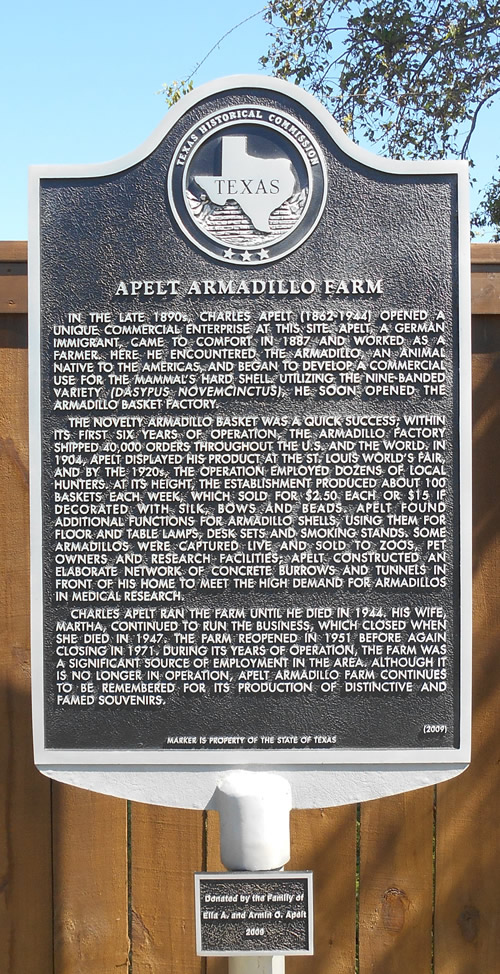Books by
Michael Barr
Order Here: |
|
An
armadillo is half blind, dumb as a rock and ugly as a '62 Buick. Its
appearance has been compared to a walking cannon ball, a 4-legged
battleship, a cross between a pig and a Sherman tank and a 20 lb.
rat wearing a suit of armor. It digs like an auger, shares its living
quarters with skunks and rattlesnakes and devours 40,000 fire ants
for breakfast. Oh yeah, and its shell makes a dandy sewing basket.
The Apelt Armadillo Farm, on Highway 27 between Comfort
and Center
Point, once sold armadillo shell baskets all over the world. The
farm was a Hill Country conversation piece for most of the 20th century.
As far as anyone knows it was the only business of its kind on the
planet. |
Apelt Armadillo Farm entrance
Photo courtesy Michael
Barr , June 2020 |
|
Founder Charles
Apelt was born in Muhlenberg, Germany in 1862. As a teenager he
was apprenticed to a basket weaver. By the time he was 30 years
old he was superintendent of a wicker furniture and basket factory
in Bavaria. He came to Texas in the 1890s; drawn to the Hill
Country by the impassioned letters of an uncle who settled in
Kendall County
in the mid-19th century.
One of the first wild animals Apelt saw on arriving in Texas was
a 9 banded armadillo - a creature whose ancestors had migrated from
South America. Because an armadillo cannot store fat and it doesn't
hibernate, the northern migration stopped at deserts and colder
climates.
The armadillo has terrible eyesight but hears well and possesses
a keen sense of smell. It eats bugs and roots. It has few teeth,
but its claws can be formidable weapons. It is a mammal, although
some people think it is a reptile - a holdover from the age of the
dinosaurs. Female armadillos always give birth to quadruplets, all
of the same sex.
By the 20th century the bears and wolves that might have controlled
the armadillo population had disappeared from the Hill
Country. Today a Texas armadillo has few natural predators -
mostly Fords and Chevys.
When
Charles Apelt first saw an armadillo he thought the shell looked
like a basket. He turned that vision into his version of the American
dream when he started his armadillo farm in 1898.
In the early days Apelt conducted armadillo roundups. He placed
ads in Hill Country
newspapers offering $1.50 for live females. He then sold armadillos
to zoos, for medical research and for pets, although a pet armadillo
has its problems. An armadillo can dig under just about any fence
and there's nowhere to attach the leash. Still, business was brisk.
Apelt once sold 20,000 live armadillos in one year.
But by far the biggest part of the business was making and selling
baskets made from armadillo shells. Apelt and his employees dried
and shellacked each shell and then formed the handle by bringing
the tail around and joining it to the snout. Workers also turned
shells, which the armadillos surrendered unwillingly, into lamp
shades, desk sets, smoking stands, cookie holders and wall plaques.
The baskets sold especially well. The Buckhorn Saloon in San
Antonio was Apelt's biggest customer.
There was even a limited market for armadillo meat. (It tastes like
turtle they say). Apelt's farm supplied armadillo meat to dude ranches
near Bandera
where cooks barbequed it and fed it to hungry tourists gathered
around the chuck wagon. At least one fancy restaurant in Houston
featured barbequed armadillo as a specialty on its menu.
When Charles Apelt died in 1944, his son Kurt and wife Katherine
took over the farm. A son-in-law started a branch business in Salado.
Then in the 1970s the armadillo trade began to decline when treatment
of all animals came under scrutiny. Besides, the novelty had worn
thin. The rumor that some armadillos had leprosy didn't help.
The armadillo farm is no longer in business, but Charles Apelt's
armadillo shell baskets are prized possessions of Texana lovers.
They can be found in antique shops all over the country. Some sell
for thousands of dollars.
I once had an armadillo in my back yard. I wanted to turn him into
a basket.
|
 |
Apelt Armadillo Farm Historical Marker
Photo courtesy Michael
Barr , June 2020 |
© Michael
Barr
"Hindsights"
June 15, 2020 Column
Sources:
"Armadillos: A Cash Crop," San Antonio Express and News,
October 27, 1963.
"Protective Shell for Armadillo Farm," San Antonio Light, March
13, 1967.
"Armadillo fine Pet," San Antonio Light, March 14, 1967.
"Brothers want armadillos to be household animals," Odessa American,
October 23, 1983. |
|
|
